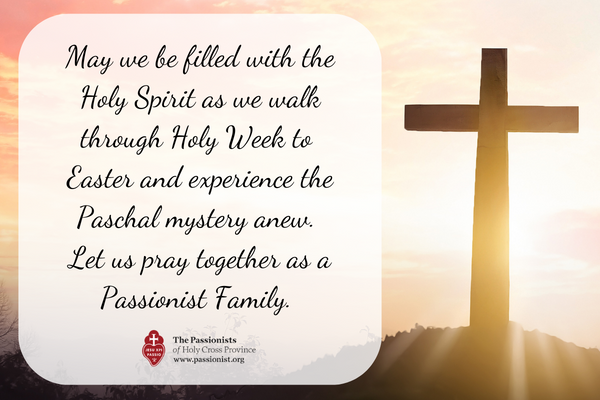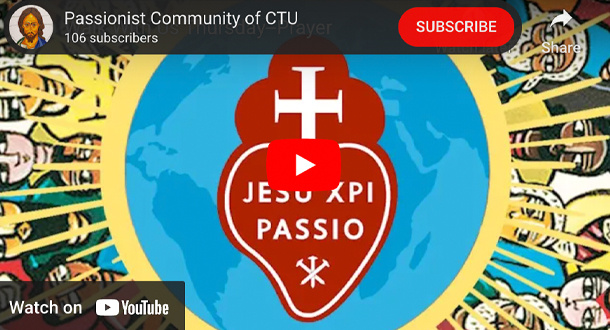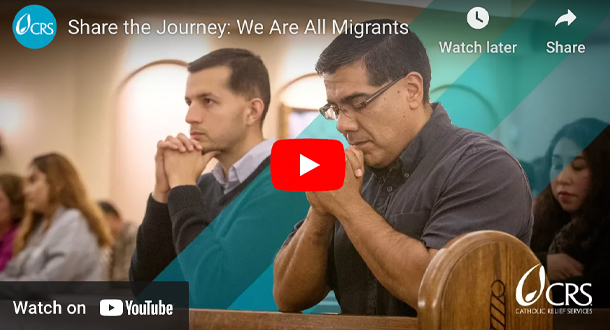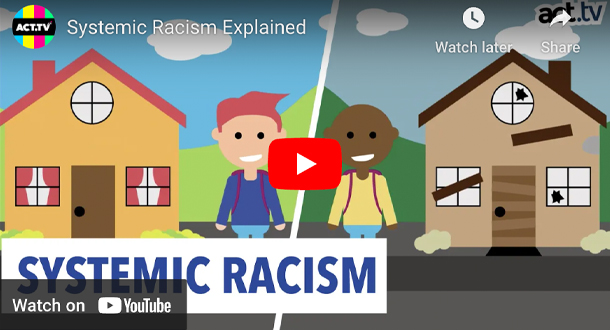
In this issue
- Prayer for Holy Week
- We Want to Hear from You!
- What does the Church say about Migration?
- Open Wide Our Hearts
- Walk with Us Thursdays
We Want to Hear from You!
As we prepare for Chapter 2023, please feel free to reach out to the members of the Chapter Planning Committee with any proposals, thoughts, questions or suggestions. You can reach all members of the Committee at any time by emailing [email protected].
The Chapter Planning Committee
Faith Offman, Chair
Joe Castro
David Colhour, C.P.
Phil Paxton, C.P.
Jim Strommer C.P.
Elizabeth Velarde
Keith Zekind
Robert Choiniere, Facilitator
Visit the Chapter Website
What does the Church say about Migration?
According to Catholic social teaching, migration should be a matter of choice, not necessity. People have a right not to have to migrate, and states have a responsibility to provide the minimal conditions that would allow their residents to flourish and realize their God-given rights at home.
As Catholics, what should we think about people who come to this country as immigrants? Should we support people breaking the law by coming here without documentation or permission? What does the Church say about immigration?
Catholic theology has always promoted an ethic that is rooted in natural law and God’s Revelation. As Catholic social teaching on migration developed, three fundamental principles came to inform Church teaching on this issue:
- People have the right to migrate to sustain their lives and the lives of their families.
- A country has the right to regulate its borders and to control migration.
- A country must regulate its borders with justice and mercy.
Although the first two of these principles may seem to contradict each other, they are put into context by the third. People of faith must seek a way of balancing their valid security needs while at the same time striving to meet the basic human needs of others, including those who are foreign-born. It is in achieving this balance that we can embrace each of the principles of Catholic social teaching on migration.
When war, natural disaster, famine or crushing poverty causes mass migration, the lands that receive these displaced people may feel threatened, with the citizens of the host nation fearing that newcomers will take scarce jobs, land and resources. While recognizing these fears, the Church teaches that people have the right to migrate to sustain their lives and the lives of their families. As the Gospels make clear, it is God’s will that the abundance of the earth be shared in love by all his people.
Reflecting on this spiritual imperative, Pope Benedict XVI observed that “those who have to leave everything, sometimes even their family, to escape from grave problems and dangers . . . [should find] the Church as a homeland where no one is a stranger” (Angelus, June 19, 2005). At the same time, the second principle of migration acknowledges that a country has the right to regulate its borders and to control migration. Individuals have the right to move in search of a safe and humane life, but no country is bound to accept all those who wish to resettle there.
Ordinarily, people migrate because they are desperate, and the opportunity for a safe and secure life does not exist in their own land. Migrants and refugees endure many hardships, and most would prefer to return home under more favorable circumstances. As American Catholics, we should work to alleviate the conditions that force people to leave their homeland while protecting their rights when they reside among us.
The third principle calls upon nations to regulate their borders with justice and mercy, seeking the common good above self-interest. Family reunification must be at the center of all government migration policies, thereby allowing families to remain intact as much as possible and avoiding periods of prolonged separation.
The above was reprinted with permission from the USCCB.
Please contact the Migration Committee Co-Chairs should you have any comments or questions:
Joe Castro, Co-Chair
[email protected]
Alfredo Ocampo, C.P., Co-Chair
[email protected]
Here is a YouTube video that gives us a glimpse of a family story on a journey for a better life in the United States:
From the Cultural and Racial Diversity Committee

What is Systemic Racism?
Today, racism continues to exist in our communities and in our parishes. Racism is what makes us see the "other" with suspicion or to attribute negative characteristics to an entire group of people. This evil manifests itself in our individual thoughts, and also in the workings of our society itself. Today's continuing inequalities in education, housing, employment, wealth, and representation in leadership positions are rooted in our country's shameful history of slavery and systemic racism.
Systemic Racism
Discrimination based on race and ethnicity takes many forms. The United States has made progress in eliminating some of the institutional, legalized racial discrimination of years past such as slavery, Jim Crow laws, “separate but equal” schools, and prohibitions on voting or owning land.
These hard-fought victories deserve to be remembered and celebrated. Still, these advances are incomplete. Data on social and economic welfare show disparities between many persons of color and their white counterparts.
- Unemployment rates for Africans Americans, Latinos, and Native Americans are considerably higher than the national average. Growing income inequality increasingly affects minorities.
- In the United States, median wealth for white households is ten times greater than for black households, and eight times greater than for Hispanic households.
- Minority homeownership rates lag behind their white counterparts, and yet research shows that minorities face extra hurdles in getting approved for mortgages.
- African Americans, Latinos, and Native Americans are disproportionately affected through every stage of the criminal justice system, despite the evidence that different racial and ethnic groups commit crimes at roughly the same rate.
The above was reprinted with permission from the USCCB.
Systemic racism affects every area of life in the United States. From incarceration rates to predatory loans and trying to solve these problems requires changes in major parts of our system.
Here is a closer look at what systemic racism is, and how we can solve it:
Join Us for Walk with Us Thursdays!
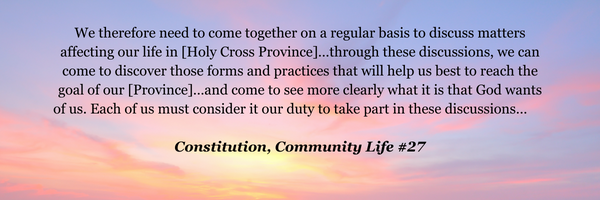
The Chapter Planning Committee (CPC) invites you to join us for Walk With Us Thursdays to prepare for the communal discernment that will take place at our June 2023 Chapter. These conversations will be held via Zoom at 4:30 pm, PDT; 5:30 pm, MDT; 6:30 pm, CDT; 7:30 pm, EDT.
Walk with Us Thursdays Zoom Link
We recognize that we all have very busy calendars, but we pray that you will find a way to join us for this important work and preparation for our June 2023 Chapter.
As a reminder, there is no Walk With Us Thursdays conversation this Thursday, April 6. Our next one will be Thursday, April 13. Our topic will be Leadership. We have come to understand that the traditional role of the Provincial is no longer tenable and realize that going forward a different model of leadership would be more appropriate. We look forward to our conversation with you next week around leadership.
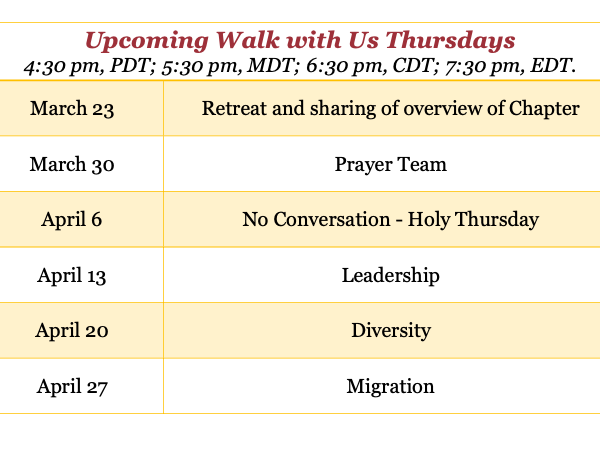
Walk with Us Thursdays Zoom Link

Dios Amoroso,
We thank you, for You have led us
to grow together in the Passionist Way.
You have called us, not only as individuals,
but together as a Passionist Family,
juntos como hermanos y hermanas,
to recognize more and more the crucified of today.
We hold in our hearts and minds
all of crucified creation: migrants and refugees,
and those beset by poverty and violence, systemic racism,
injustice and oppression, pain and distress.
As we prepare for our upcoming Provincial Chapter,
keep us forever on the path we pray.
Help us to continue to hear the cries of the crucified,
as we work together as the visionaries You have called us to be.
Foster in us the leadership required to meet the needs of our times.
May whatever conclusions we draw, whatever actions we take,
be done en el amor de Cristo Crucificado, and in His name, we pray.
Amen.
Holy Cross Province
2023 Chapter
June 8-13, 2023
Sierra Madre, California
All materials for Chapter can be found
on the Chapter 2023 website at https://passionist.org/chapter2023/
We want to hear from you!
Contact the Chapter Planning Committee (CPC) at [email protected]

